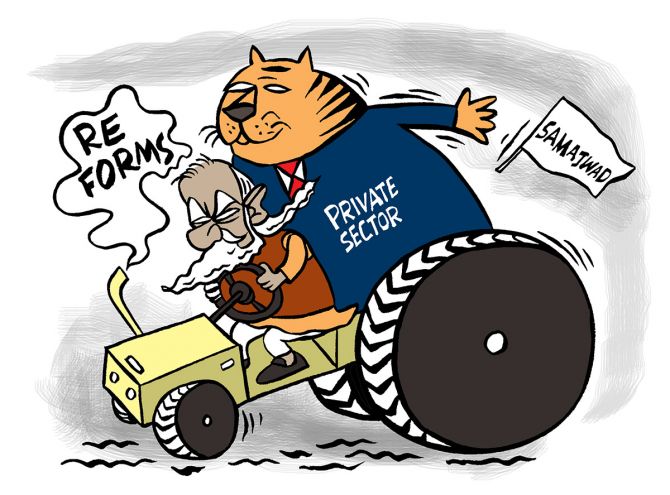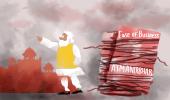It's time Rahul Gandhi became attuned to the reality of the 21st century instead of recycling failed political jargon of the 20th century,' argues Virendra Kapoor.

A vast majority of politicians have little understanding of the Budget.
Nonetheless, when asked to comment, they have a set response depending on where they stand politically.
Long years ago, Atal Bihari Vajpayee, then the tallest leader on the Opposition benches, had confessed that he could react to the Budget even before it was presented.
'Garibo key pet pe laat... Aamiro ko laddoo...' And a couple of words more about the high fiscal deficit being inflationary would just about complete his response which would invariably find prominent place in the next day's newspapers.
Vajpayee is no more with us.
But those now in the Opposition ape him, at least while responding to the Budget.
Rahul Gandhi may not be Vajpayee. No, not even by a long shot.
But when it comes to the Budget, he seems to follow the late Jana Sangh-BJP veteran.
Rahul's characterisation of Nirmala Sitharaman's generally well-received Budget as pro-rich was on expected lines.
In a bid to catch next day's headlines, he came armed with a neat little two-liner, echoing the 1960s family planning campaign.
'Hum Do, Hamare Do' for him neatly summed up what the Budget was all about.
His speech in the Lok Sabha was short and marked by noisy interruptions from the ruling party benches.
But he had come armed with 'jumlas.'
Unlike his catchy 'suit-boot ki sarkar' description of Modi 1.0, which many believe led the PM to drop the move to amend the UPA's hastily-framed land acquisition law, the clever reference to Modi and Shah (Hum Do) and Ambani and Adani (Hamare Do) would, however, fail to force Modi-2.0 on the back foot.
What Rahul does not seem to reckon is that Modi as prime minister for more than seven years has grown in stature and in confidence while not many in his Congress party would like to say that about him.
In fact, he may have actually regressed -- in 2014 he could still retain the family fief in Amethi; in 2019 he had had to seek shelter in Wayanad.
There is also a simmering internal challenge to his stewardship of the family-controlled Congress.
Further, the Modi of 2019 commands a full majority on his own and can unleash bold economic reforms to put the country on the path of high growth.
Having implemented a number of pro-poor welfare schemes in his first term, Modi seems no longer afraid to stand up for the business class as a whole.
The hypocrisy of the Socialist decades when Congress leaders would rail against capitalists from the pulpit and do deals with them in private, and make economic policies to suit their bulging pockets, is behind us.
Having experienced nothing but shortages and deprivations in the Socialist decades, even the ordinary people are no longer enamored of Socialism.
Post-1991, the people have experienced first hand the gains of economic liberalisation, of an open system in which the private sector is treated as a partner rather than an adversary of the government in economic growth.
Today's poor are better off than those of the 1960s and 1970s.
Income levels of every strata have risen post-liberalisation.
Yes, economic disparities have grown, but the threshold of poverty is now such that it keeps even the poor protected from extreme shortages and hunger.
In achieving this, the first Modi government's contribution cannot be denied.
Whether it is the provision of highly subsidised cooking gas to tens of millions of village women, or the generous funding for building toilets or the old-age pension and the outright quarterly payment to farmers, and the provision of health insurance, etc, Modi-1.0 did far more than the self-avowed Socialist governments that came before it had done for the poor.
In 2021, abusing the government for being pro-rich does not fetch votes.
Decades of samajwad have made even the poor cynical.
They will no longer lend a ear to the nostrums of samajwad.
So Rahul is wrong to think he is winning friends by trying to paint the Modi Sarkar as pro-rich.
The Ambanis and Adanis may be amused at being dragged by Rahul in a partisan political dogfight, shrugging off the reference to them as his desperation to find relevance in the Modi-dominated polity.
But aside from a clever one-liner, such interventions will not yield electoral gains for Rahul.
The larger point from the somewhat diffused debate on the economic direction of the Budget is that there are no conviction-politicians around.
Ideology as a marker of political vanished some years ago, particularly after the end of the Cold War following the collapse of the Soviet Union.
The success of the hybrid Chinese model, authoritarian in the political sphere and pragmatic economic, with the State playing a huge role as owner and operator of huge business/industrial corporations, is predicated on Deng Xiaoping's well-known dictum: It does not matter whether the cat is white or black so long as it catches mice.
So, whether it is the government or the Ambanis or Adanis, what should matter is whether the ordinary people are able to live with dignity, with all the basic amenities of life which make life livable.
To Modi's credit, in his second stint he has not shrunk away from doing the right, pragmatic, thing in spite of Rahul reprising his clever 'jumla' about 'suit-boot-ki-sarkar' with the follow-up 'Hum do, Hamare Do.'
Modi's bold decision to divest a number of public undertakings, his refusal to tax the rich in the current Budget despite the pandemic-induced slowdown, his further opening up of the economy to foreign investment, are all steps in the right direction.
Even the robust defence of agri sector reforms in spite of the ongoing noisy protests reveals a confident prime minister set resolutely on the path of economic reforms.
For there is no getting away from the fact that without partnering the private sector no government can hasten the pace of economic development.
It may sound strange to Rahul Gandhi, but the truth is that in the liberalised era the private sector is far better regulated, far better policed for unscrupulous practices than it was at the peak of Samajwad.
It's time Rahul Gandhi became attuned to the reality of the 21st century instead of recycling failed political jargon of the 20th century.
Feature Presentation: Aslam Hunani/Rediff.com










